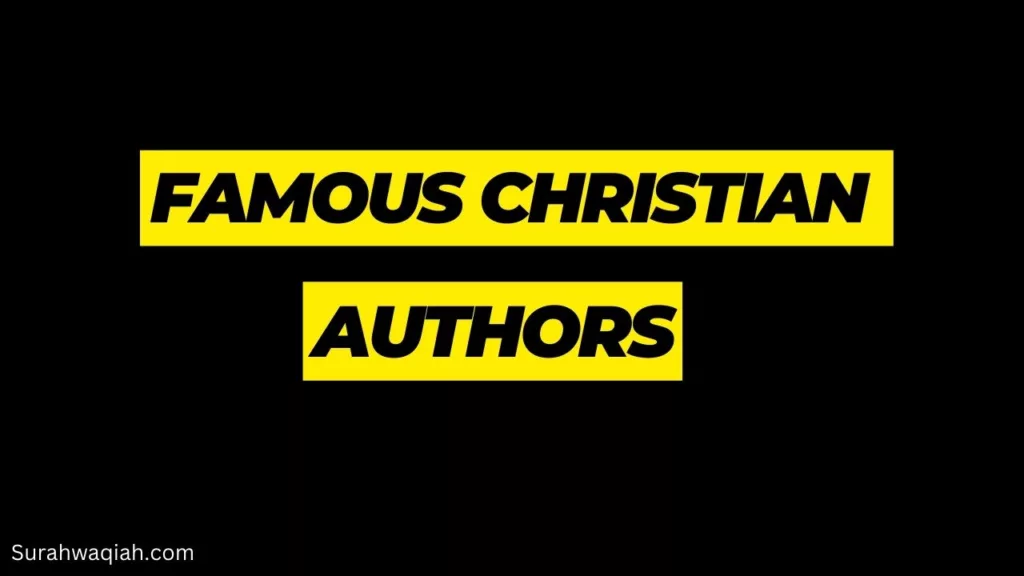Famous Christian Authors | Name | Explanation | 2023
Discover the profound insights and faith-driven writings of renowned Christian authors.

Famous Christian Authors
Some of the most famous Christian authors in history include Saint Augustine of Hippo, C.S. Lewis, Dietrich Bonhoeffer, G.K. Chesterton, Thomas Merton, John Bunyan, Søren Kierkegaard, Madeleine L’Engle, John Piper, and Elizabeth Elliot, among others.

- Christian Holidays | Exploring Christian Festivals
- Surah Nasr | 110th Chapter | The Divine Assistance | 2023
- Is the Quran Older than the Bible?
Introduction
Throughout history, Christian literature has been a powerful medium for conveying faith, spirituality, and moral teachings to countless readers worldwide. The works of famous Christian authors have not only shaped Christian thought but have also contributed to the broader literary and philosophical discourse. In this article, we will delve into the lives and legacies of some of the most renowned Christian authors, highlighting their impactful contributions to both literature and the Christian faith.
Saint Augustine of Hippo (354-430 AD)
Saint Augustine, one of the most influential figures in Christian theology, penned numerous works that continue to shape Christian thought. His autobiographical “Confessions” provides a profound exploration of his spiritual journey and conversion to Christianity. Augustine’s “City of God” remains a seminal text on Christian philosophy and the relationship between the earthly and heavenly cities.
C.S. Lewis (1898-1963)
Clive Staples Lewis, better known as C.S. Lewis, is celebrated for his imaginative fiction, apologetic writings, and Christian allegories. His “Chronicles of Narnia” series has captivated readers of all ages with its allegorical Christian themes. Lewis’s apologetic works, including “Mere Christianity” and “The Problem of Pain,” have played a pivotal role in defending and explaining the Christian faith.
Dietrich Bonhoeffer (1906-1945)
Dietrich Bonhoeffer, a German theologian and pastor, is remembered for his courageous stand against the Nazi regime. His book “The Cost of Discipleship” challenges Christians to live out their faith authentically and sacrificially. Bonhoeffer’s life and writings continue to inspire those seeking to navigate the intersection of faith and social justice.
G.K. Chesterton (1874-1936)
Gilbert Keith Chesterton, a prolific writer and theologian, is known for his wit and wisdom. His apologetic works, such as “Orthodoxy” and “The Everlasting Man,” defend the Christian faith with humor and profound insights. Chesterton’s influence on Christian apologetics and the revival of Christian orthodoxy in the early 20th century is undeniable.
Who are some of the most famous Christian authors in history?
Some of the most famous Christian authors in history include Saint Augustine of Hippo, C.S. Lewis, Dietrich Bonhoeffer, G.K. Chesterton, Thomas Merton, John Bunyan, Søren Kierkegaard, Madeleine L’Engle, John Piper, and Elizabeth Elliot, among others.
What are Saint Augustine’s most significant works?
Saint Augustine is renowned for works such as “Confessions,” an autobiographical account of his conversion to Christianity, and “City of God,” a foundational text in Christian philosophy.
How did C.S. Lewis impact Christian literature?
C.S. Lewis is known for his allegorical Christian themes in “The Chronicles of Narnia” series and his influential apologetic works like “Mere Christianity” and “The Problem of Pain.”
What was Dietrich Bonhoeffer’s contribution to Christian thought?
Dietrich Bonhoeffer challenged Christians to live out their faith authentically and stood against the Nazi regime. His book “The Cost of Discipleship” remains a significant work in Christian ethics.
How did G.K. Chesterton defend the Christian faith?
G.K. Chesterton used wit and wisdom in his apologetic writings, such as “Orthodoxy” and “The Everlasting Man,” to defend and explain Christian beliefs.
What is Thomas Merton’s connection to Christian mysticism?
Thomas Merton, a Trappist monk, wrote about the contemplative life and engaged in dialogue with Eastern spirituality, expanding the horizons of Christian mysticism.
Thomas Merton (1915-1968)
Thomas Merton was a Trappist monk whose contemplative writings, including “The Seven Storey Mountain,” have resonated with seekers of spiritual depth. Merton’s exploration of the contemplative life and dialogue with Eastern spirituality has expanded the horizons of Christian mysticism.
John Bunyan (1628-1688)
John Bunyan’s “The Pilgrim’s Progress” stands as one of the most-read books in Christian literature. This allegorical masterpiece vividly portrays the Christian journey, with its trials, temptations, and ultimate hope of reaching the Celestial City. Bunyan’s work continues to inspire believers on their spiritual pilgrimage.
Søren Kierkegaard (1813-1855)
Søren Kierkegaard, a Danish philosopher and theologian, is often regarded as the father of existentialism. His writings, including “Fear and Trembling” and “The Sickness Unto Death,” explore the nature of faith, despair, and the human condition. Kierkegaard’s thought profoundly influenced Christian existentialism and modern theology.
Madeleine L’Engle (1918-2007)
Madeleine L’Engle’s “A Wrinkle in Time” is a beloved work of Christian science fiction and fantasy. Her writing skillfully weaves together science, theology, and imagination to explore themes of love, light, and the battle between good and evil. L’Engle’s books continue to resonate with readers seeking spiritual depth in a complex world.
John Piper (1946-present)
John Piper, a contemporary Christian author and pastor, is known for his passionate and biblically grounded writings. His books, including “Desiring God” and “Don’t Waste Your Life,” emphasize the pursuit of joy in God and the importance of a Christ-centered life. Piper’s ministry has had a profound impact on the modern Reformed movement.
Elizabeth Elliot (1926-2015)
Elizabeth Elliot’s courageous story of missionary work among the Waorani people in Ecuador is told in “Through Gates of Splendor.” Her writings on surrendering to God’s will and enduring suffering with faith have inspired generations of Christians to live boldly for Christ.
Conclusion
Famous Christian authors have left an indelible mark on both Christian literature and the broader world of literature and philosophy. Their works continue to inspire, challenge, and nourish the faith of believers while engaging with timeless questions about the human condition and the nature of God. These authors remind us that the written word can be a powerful vehicle for exploring faith, spirituality, and the complexities of life.
What is the significance of John Bunyan’s “The Pilgrim’s Progress”?
“The Pilgrim’s Progress” is an allegorical masterpiece that vividly portrays the Christian journey, trials, temptations, and the ultimate hope of reaching the Celestial City.
How did Søren Kierkegaard influence modern theology?
Søren Kierkegaard’s writings on faith, despair, and the human condition had a profound impact on Christian existentialism and modern theology.
What themes are explored in Madeleine L’Engle’s “A Wrinkle in Time”?
“A Wrinkle in Time” explores themes of science, theology, love, and the battle between good and evil in a Christian science fiction and fantasy context.
What is John Piper’s main message in his books?
John Piper emphasizes the pursuit of joy in God and the importance of a Christ-centered life in his books, including “Desiring God” and “Don’t Waste Your Life.”
How did Elizabeth Elliot inspire others through her writings?
Elizabeth Elliot’s books, such as “Through Gates of Splendor,” tell her courageous story of missionary work and inspire readers to surrender to God’s will and endure suffering with faith.
Are there any contemporary Christian authors making an impact today?
Yes, many contemporary Christian authors continue to make an impact on literature and theology. Some notable names include Timothy Keller, N.T. Wright, Anne Lamott, and Max Lucado, among others.





